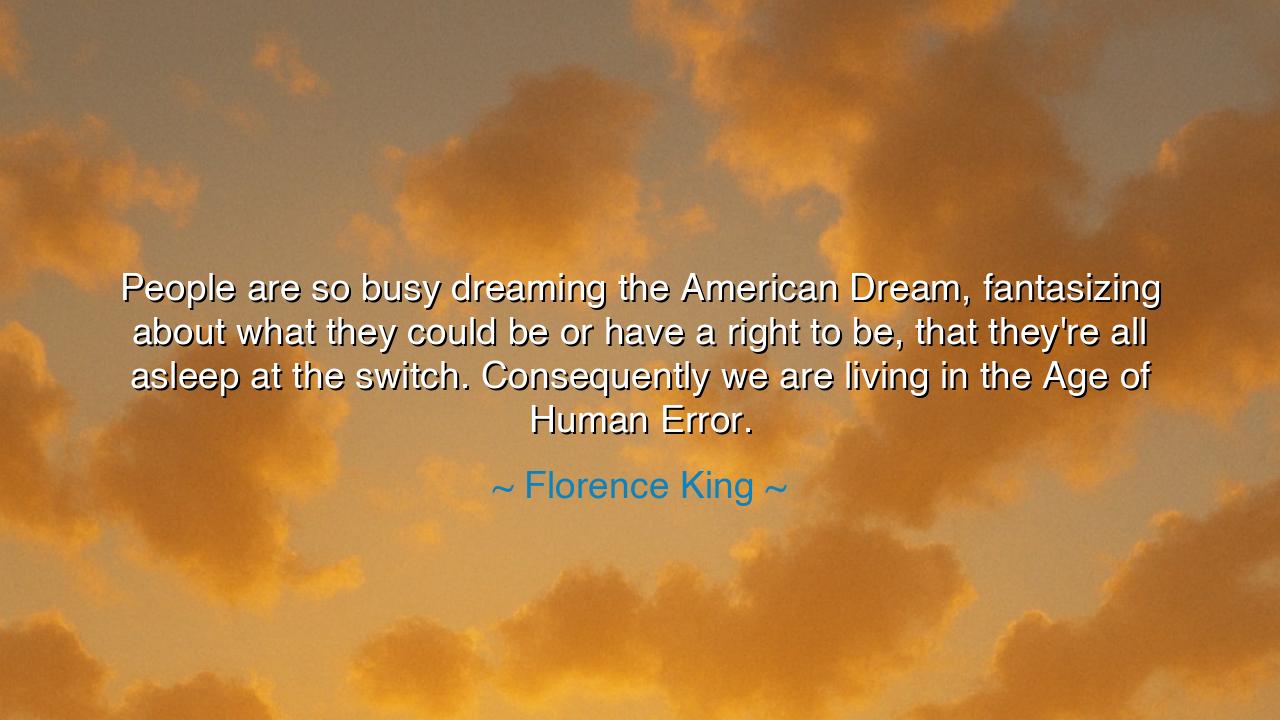
People are so busy dreaming the American Dream, fantasizing about
People are so busy dreaming the American Dream, fantasizing about what they could be or have a right to be, that they're all asleep at the switch. Consequently we are living in the Age of Human Error.






“People are so busy dreaming the American Dream, fantasizing about what they could be or have a right to be, that they're all asleep at the switch. Consequently we are living in the Age of Human Error.” — Thus wrote Florence King, the sharp-tongued essayist and chronicler of human folly, whose wit was as fierce as her insight was profound. In these words, she offers not merely criticism but prophecy — a lament for a generation consumed by illusion. Her voice, cutting yet sorrowful, calls to us from a place of clarity: that mankind, in its obsession with fantasy, has forgotten awareness; that in chasing dreams, we have neglected the discipline required to make them real.
To dream is noble, for dreams are the seed of creation. Yet King speaks here of a different kind of dreaming — not the divine vision that inspires, but the illusion that numbs. The American Dream, once a call to effort and freedom, has become, in her eyes, a theater of entitlement and distraction. It no longer urges people to labor for greatness, but seduces them into fantasizing about what they “deserve.” And in that endless reverie, vigilance fades. The people, she says, are “asleep at the switch” — inattentive to the world’s turning gears, to the real work that sustains civilization.
In calling our age the “Age of Human Error,” King does not mean that men have suddenly become foolish; she means that they have become careless. The errors of this age are not born of ignorance, but of inattention. The mind that could build wonders has grown lazy, distracted by comfort and illusion. It is not that we cannot think, but that we will not. The farmer no longer watches the field, the leader no longer listens to the people, and the citizen no longer questions the truth. When men sleep while machines run, accidents are inevitable — and so, says King, we live surrounded by the wreckage of our own neglect.
This truth is not new. The ancients, too, warned of it. Plato spoke of the cave, where men sit facing shadows, believing them to be reality, until one awakens and turns toward the light. Florence King’s “American Dream” is that same cave — a world of flickering fantasies, where people stare at the images of success and pleasure while real life decays behind them. To awaken is painful; to remain asleep is easy. Thus, most choose sleep. They dream of freedom while becoming slaves to distraction.
Consider, too, the story of the Great Depression — an era that revealed the consequences of sleep. For years, the nation dreamed endlessly of wealth, credit, and progress, blind to the instability beneath its glittering surface. When the illusion broke, the people awoke too late. Yet from the ruin rose a new kind of strength: those who survived learned again the value of discipline, vigilance, and work. They remembered that prosperity is not a birthright but a craft. So too, King’s warning is a call to remembrance — to wake before the next fall, before another age of error consumes us.
Her words are not merely political, but deeply philosophical. She asks each of us to look inward and see where we, too, have fallen asleep — where we have traded reality for wishful thinking. To be awake is not simply to see the world’s beauty, but to confront its truth. It is to notice the small failures that grow into great ones, to take responsibility rather than comfort, to act with awareness in a world of dreamers.
The lesson, then, is this: do not lose yourself in fantasies of what you could be; become it through discipline and wakefulness. Do not merely “believe” in the dream; build it, stone by stone, through effort and clarity. For every man and woman must guard the switch of their own life — the lever that keeps purpose in motion. To sleep is to drift into error; to wake is to reclaim power.
So let us heed Florence King’s warning. Dream, yes — but dream with open eyes. Let your vision inspire, not sedate. Let your imagination serve truth, not flee from it. The world does not perish from lack of dreams, but from lack of those awake enough to make them real. And if we are indeed in an Age of Human Error, then the cure is not despair, but awakening — the courage to rise from the fog of fantasy and meet reality with wisdom, will, and the full force of a conscious mind.






AAdministratorAdministrator
Welcome, honored guests. Please leave a comment, we will respond soon